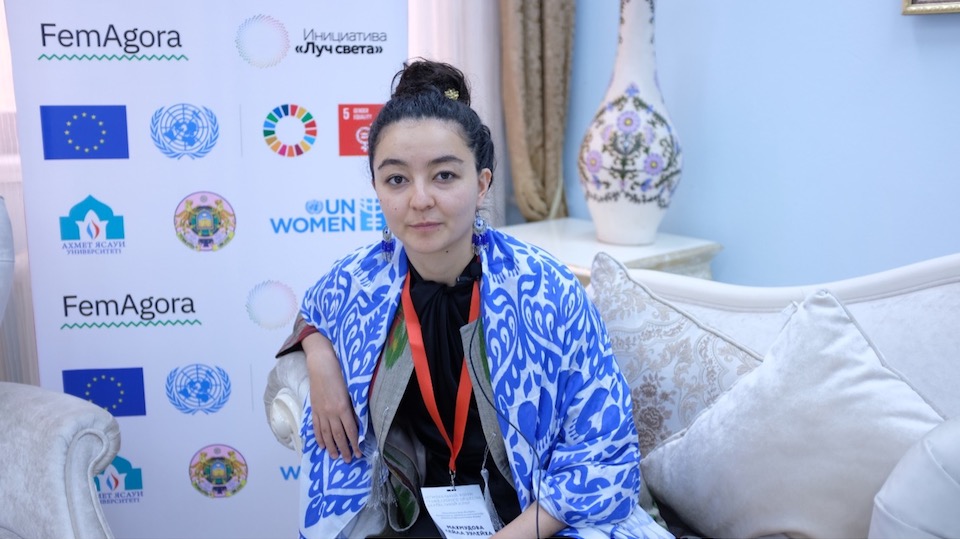Civil society organizations from Afghanistan and Central Asia converge to discuss joint strategy for preventing gender-based violence
Date:
From 1–2 November, representatives of civil society organizations (CSOs) from Afghanistan and five countries in Central Asia convened in Kazakhstan to develop recommendations for consolidated efforts to prevent sexual and gender-based violence (SGBV) in the region.
More than 60 civil society representatives (30 in-person and 30 online) from Afghanistan, Kazakhstan, Kyrgyzstan, Tajikistan, Turkmenistan and Uzbekistan drew on their experiences to collectively develop recommendations for an effective strategy to meaningfully engage CSOs in the Spotlight Initiative Regional Programme for Central Asia and Afghanistan (the SI Regional Programme).
Addressing the participants, UN Women Representative in Kazakhstan, Maria Dotsenko, emphasized that one of the most important and strategic regional initiatives is the creation of a Central Asian Alliance on ending sexual and gender-based violence and harmful practices within the framework of the European Union and United Nations (EU-UN) Spotlight Initiative.
“The goal of the Alliance is to strengthen cooperation and mobilize all stakeholders to jointly counter violence,” explained Dotsenko. “The active participation of CSOs and representatives from Central Asian countries will improve the exchange of experiences and the application of best practices for the successful development of joint solutions. We hope that, thanks to the combined efforts of Forum participants and partners, we will see the roles and influence of civil society grow.”
There are a wide range of local and regional public sector associations and CSO platforms addressing and responding to SGBV and harmful practices in the region. These include crisis centres and shelters, public associations and movements, non-governmental organizations, and other initiatives or groups representing the rights and interests of women and girls. For three decades, Central Asian women-led organizations and women experts have also contributed to global processes such as the Beijing Declaration and Platform for Action, the Commission on the Status of Women and the Generation Equality Forum, amongst others.
Sabir Agabalaev is Director of Keyik Okara, a CSO that has been helping survivors of violence in Turkmenistan for more than 20 years. This organization provides counselling, psychological assistance and legal support for women, families with many children, people with disabilities, low-income families, families in difficult life situations, and engages young people.
“This forum allows us to not only exchange experiences but to consolidate efforts,” emphasized Agabalaev. “And if we succeed in the Central Asian Alliance on ending SGBV and harmful practices, we will continue to interact and will not work as one organization but as a network of public organizations. The idea is very good and promising because the voice of 30 to 40 organizations of all countries in the region is stronger than the voice of just one.”
Qurbangul Qosimova, Director of the Najoti Kudakon CSO in Tajikistan, added: “We are excited about the idea of the Central Asian Alliance on ending SGBV and harmful practices. We really want to expand the geography of the Alliance and contribute to its work, because by uniting, regardless of where our organizations are located, unity will strengthen our voice, and we will be able to represent the interests of women in various instances.”
The Forum served as a space for CSO representatives from Central Asia and Afghanistan to connect, find common ground, and discuss the results of national consultations organized under the Spotlight Regional Programme. It also served to acquaint them with partnership mechanisms and the process of creating a grant-giving organization in the region.

“The main result of this Forum is the creation of a document that has been discussed for several months,” explained the Forum’s Co-Chair, Leyla Zuleikha Mahmudova, who also founded FemAgora. “It is based on the outcomes of discussions of global, regional and national consultations, in which CSOs gave their recommendations about how intergovernmental organizations should work with civil society. This document now consists of three principles: accountability, intersectionality and equality. Overall, the Forum showed that civil society is very interested not only in uniting with other stakeholders – the governments of our countries, academics and others – but also in discussing the necessary conditions for this regional Alliance.”
Participants of the two-day forum emphasized the importance of a collective vision and expressed their willingness to strengthen cooperation within the Central Asian Alliance on ending SGBV and harmful practices and the SI Regional Programme to reach more women and girls in the region whose rights are violated and affected by current crises.